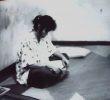The Philippine government and Japan have no record of the number of neglected Japanese descendants in the country � many of them are in Davao — because their birth certificates show their citizenship as Filipino. Worse, some Japanese fathers refuse to recognize these children as from their blood despite the Filipino mother declaring otherwise.
By Patricia Marcelo
ofwjournalism.net
QUEZON CITY � Some rely on just their surnames to carry them to Japan and, hopefully, a better life. A group here wants to help.
Since August, the Federation of Nikkei-Jin Kai Philippines Inc. is undertaking a poll of Shin-Nikkei-jin (Japanese descendant) in the Philippines who were abandoned by their Japanese fathers.
The federation of 16 groups spread throughout the archipelago perceives these people to number in the thousands but government statistics remain unavailable or inaccurate.
The Philippine government and Japan have no record of the number of neglected Japanese descendants in the country because their birth certificates show their citizenship as Filipino.
Worse, some Japanese fathers refuse to recognize these children as from their blood despite the Filipino mother declaring otherwise.
Like the mother of 17-year-old Shilla-Mei Murakami who brought her to the office of federation-member Manila-Central Luzon NIPPI (Japan-Philippines) Association Inc. for inclusion into the group�s census.
�I want to meet my father and work in Japan,� said Murakami, a single mother to a seven-month old baby.
The five-foot Murakami stopped going to school after getting pregnant during her senior year. She works as a waitress in a coffee shop in Quezon City while living with her mother, who has since retired from working as an entertainer in Japan.
Beside her is 13-year-old Toshiyuki Ito Jr., who is more fortunate: he was able to meet his father.
Since Ito�s Japanese father was an entertainment promoter in Japan, he would make it a point to visit the young Ito when he was in Manila despite separating from the mother in 1996. The young Ito was just three years old that time.
He said they went to the federation�s office to seek help since his father has stopped seeing him since December 2000.
Murakami and Ito were among the 16 Shin-Nikkei-jins who registered with the MCLNAI the day that the group began its intensive search for an estimated 100,000 Japanese descendants in the country.
The federation expects to confirm that number when they reveal partial results by November this year.
Poled poll
The Federation said it launched its nationwide three-month survey to determine the number of Shin-Nikkei-jins in the country and to help these new descendants to acquire Japanese nationality, work in Japan later on, or seek financial assistance from their Japanese parent.
Those who would register in any of the federation�s chapter offices in Quezon City, province of Iloilo and the cities of Baguio, Cebu, Zamboanga, Iligan, Cotabato and Davao, would automatically be included in the list of �and presumed as� Shin-Nikkei-jins.
Japanese descendants in the Philippines could be classified into two. There�re the Nikkei-jin, or those who were born before and during the second World War.
Shin-Nikkei-jin are those born after the war, specifically in the mid-80s, when Japanese-Filipino intermarriages increased as a result of the large number of entertainers working in Japan.
Shin-Nikkei-jins wanting to be included in that list fills up a form that bares their life history in connection with their Japanese lineage: name, birthday, and address in Japan of their father, etc.
Murakami and Ito�s mothers clutch between their fingers a Manila envelope carrying other supporting documents: birth certificate signed by the Japanese father recognizing the child as his own, marriage contract, and a photograph of the Japanese parent.
Getting registered into the federation�s database is free and hoped to gain for the descendants� recognition of rights enjoyed by a Japanese citizen.
But Lourdes Yamaoka-Medina said they couldn�t promise that.
Not all the new descendants who would come to our office could be recognized as Japanese nationals, the 68-year-old MCLNAI Manila Chapter president said.
Hope Census
Statistics from Japan showed that since 1993 to 2004, children born between Japanese and Filipino couples and registered in the Family Registry numbered 60,307. However, the number of Shin-Nikkei-jins could be much higher as illegitimate children are unaccounted for.
Based on the 2003 NSO record of marriages in the Philippines, among the 17,095 intermarriages between Filipino brides and grooms with foreign nationals, Japanese grooms have the highest number at 5,468.
There were 155 Japanese brides and Filipino grooms during the same year, the statistics office added.
Yamaoka-Medina said while parents or the Shin-Nikkei-jins themselves could register with the federation anytime, the group will come up with the initial number of new Japanese descendants in the Philippines by November this year.
The result will be submitted to the Japanese embassy in Manila for possible action of the Japanese government to assist Shin-Nikkei-jins acquire Japanese nationality or locate their Japanese parent.
�I hope the federation can help us process the papers of my two children and gain recognition by the Japanese government as Japanese nationals so that when they grow up and decide to work in Japan, they will be allowed,� said Luz Marbella, 36, from Sorsogon.
Marbella, who is now married to a Filipino, is a mother of 9-year old boy and 7-year old girl, who she said are both Shin-Nikkei-jins.
She is not married to the father of her two children because he has his own family in Japan. However, Marbella, who worked as entertainer in Japan, said the Japanese recognized her kids as his children through the birth certificates that were submitted to the Philippine National Statistics Office (NSO).
The children, however, are not registered under the Japanese Family Registry or Koseki of their father. Filipino-Japanese children included in the Koseki of their Japanese father can easily acquire Japanese nationality.
Under Japanese law, all households are required to report births, deaths, marriages, divorces, and criminal convictions to their local authority, which compiles the information into a detailed family tree that encompasses everyone within their jurisdiction.
If those pieces of information are not recorded in the Koseki, the Japanese government does not officially acknowledge them.
Still, Yamaoka-Medina said they have taken the first steps to reach this goal. (OFW Journalism Consortium Inc. )









